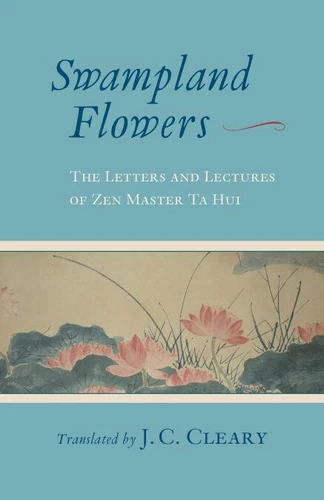Swampland Flowers. The Letters and Lectures of Zen Master Ta Hui
Par :Formats :
Disponible dans votre compte client Decitre ou Furet du Nord dès validation de votre commande. Le format ePub protégé est :
- Compatible avec une lecture sur My Vivlio (smartphone, tablette, ordinateur)
- Compatible avec une lecture sur liseuses Vivlio
- Pour les liseuses autres que Vivlio, vous devez utiliser le logiciel Adobe Digital Edition. Non compatible avec la lecture sur les liseuses Kindle, Remarkable et Sony
- Non compatible avec un achat hors France métropolitaine
 , qui est-ce ?
, qui est-ce ?Notre partenaire de plateforme de lecture numérique où vous retrouverez l'ensemble de vos ebooks gratuitement
Pour en savoir plus sur nos ebooks, consultez notre aide en ligne ici
- Nombre de pages176
- FormatePub
- ISBN0-8348-2673-9
- EAN9780834826731
- Date de parution14/02/2006
- Protection num.Adobe DRM
- Taille931 Ko
- Infos supplémentairesepub
- ÉditeurShambhala
Résumé
The writings of the twelfth-century Chinese Zen master Ta Hui are as immediately accessible as those of any contemporary teacher, and this book, which introduced them to the English-speaking world in the 1970s, has become a modern classic-a regular feature of recommended reading lists for Zen centers across America, even though the book has become difficult to find. We are happy to make the book available again after more than a decade of scarcity.
J. C. Cleary's translation is as noteworthy for its elegant simplicity as for its accuracy. He has culled from the voluminous writings of Ta Hui Tsung Kao in the Chi Yeuh Lu this selection of letters, sermons, and lectures, some running no longer than a page, which cover a variety of subjects ranging from concern over the illness of a friend's son to the tending of an ox. Ta Hui addresses his remarks mainly to people in lay life and not to his fellow monks.
Thus the emphasis throughout is on ways in which those immersed in worldly occupations can nevertheless learn Zen and achieve the liberation promised by the Buddha. These texts, available in English only in this translation, come as a revelation for their lucid thinking and startling wisdom. The translator's essay on Chan (Chinese Zen) Buddhism and his short biography of Ta Hui place the texts in their proper historical perspective.
J. C. Cleary's translation is as noteworthy for its elegant simplicity as for its accuracy. He has culled from the voluminous writings of Ta Hui Tsung Kao in the Chi Yeuh Lu this selection of letters, sermons, and lectures, some running no longer than a page, which cover a variety of subjects ranging from concern over the illness of a friend's son to the tending of an ox. Ta Hui addresses his remarks mainly to people in lay life and not to his fellow monks.
Thus the emphasis throughout is on ways in which those immersed in worldly occupations can nevertheless learn Zen and achieve the liberation promised by the Buddha. These texts, available in English only in this translation, come as a revelation for their lucid thinking and startling wisdom. The translator's essay on Chan (Chinese Zen) Buddhism and his short biography of Ta Hui place the texts in their proper historical perspective.
The writings of the twelfth-century Chinese Zen master Ta Hui are as immediately accessible as those of any contemporary teacher, and this book, which introduced them to the English-speaking world in the 1970s, has become a modern classic-a regular feature of recommended reading lists for Zen centers across America, even though the book has become difficult to find. We are happy to make the book available again after more than a decade of scarcity.
J. C. Cleary's translation is as noteworthy for its elegant simplicity as for its accuracy. He has culled from the voluminous writings of Ta Hui Tsung Kao in the Chi Yeuh Lu this selection of letters, sermons, and lectures, some running no longer than a page, which cover a variety of subjects ranging from concern over the illness of a friend's son to the tending of an ox. Ta Hui addresses his remarks mainly to people in lay life and not to his fellow monks.
Thus the emphasis throughout is on ways in which those immersed in worldly occupations can nevertheless learn Zen and achieve the liberation promised by the Buddha. These texts, available in English only in this translation, come as a revelation for their lucid thinking and startling wisdom. The translator's essay on Chan (Chinese Zen) Buddhism and his short biography of Ta Hui place the texts in their proper historical perspective.
J. C. Cleary's translation is as noteworthy for its elegant simplicity as for its accuracy. He has culled from the voluminous writings of Ta Hui Tsung Kao in the Chi Yeuh Lu this selection of letters, sermons, and lectures, some running no longer than a page, which cover a variety of subjects ranging from concern over the illness of a friend's son to the tending of an ox. Ta Hui addresses his remarks mainly to people in lay life and not to his fellow monks.
Thus the emphasis throughout is on ways in which those immersed in worldly occupations can nevertheless learn Zen and achieve the liberation promised by the Buddha. These texts, available in English only in this translation, come as a revelation for their lucid thinking and startling wisdom. The translator's essay on Chan (Chinese Zen) Buddhism and his short biography of Ta Hui place the texts in their proper historical perspective.



